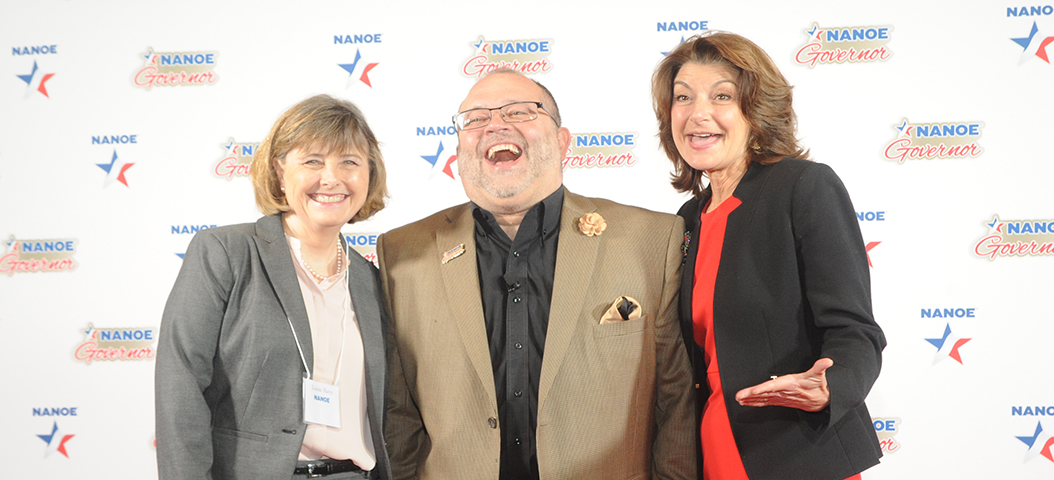
Tracy Ebarb Reveals How To Supercharge Fundraising Using “First Gifts”
March 5, 2020
Maxie Carpenter Challenges Nonprofits to Self-Navigate
March 6, 2020Jimmy LaRose Insists, “Donors Are More Important Than Clients or Causes”
Jimmy LaRose Insists, “Donors Are More Important Than Clients, Causes or People.” is meant to take you behind the scenes and provide you some select insights about how you (the donor) operate. I’d also like to help you sort out what works for you when you give, guide, and support charities.
The biggest obstacle we face in renovating civil society will not be boards, nonprofits, or consultants. The problem we’ll first have to tackle will be the misconceptions held by you! Why? Because this idea that donors are a nonprofit’s primary customer will give YOU pause.
Our puritanical roots have warped our perspectives on giving. Tragically, millennial old distortions of Judeo-Christian ethics have falsely led people to believe that if there is some sort of personal inurement attached to gift giving, the value of the act is neutralized and without merit.
Charity is not penance…charity is not a tax…charity is not a toll. The word “charity” comes from the Greek word charis and means…REJOICE, REJOICE, REJOICE!!!
Charities who understand true fundraising will bring out the best in you…will bring out the most in you…will bring out your finest gift ever and, in turn, provide millions in need a life worth living. Nonprofits who
prioritize trust building will provide you an experience so graceful, that you ‘ll say in your heart, “I can’t wait to do that again, again…and again!”

These experiences are rooted in a TRUST RELATIONSHIP between both you and the charity. ORGANIZATIONAL TRUST is built on a foundation that ensures your long-term experience is rich, sound, and based on a series of transactions that include:
BUILDING TRUST THROUGH TRANSACTIONS
1. Values…you believe in their mission, they believe in your mission
2. Solutions…you agree with their approach, they agree with yours
3. Personality…you like them, they like you
4. Opportunity…their project inspires you, they’re inspired by your potential
5. Abilities…you’re impressed with their skills, they’re impressed with yours
6. Orientation…you know what makes them tick, they know what makes you
7. Finances…you’re confident in their stewardship, they’re confident in yours
8. Reciprocity…you give, they give, you are their focus, they become yours
IT’S NOT ABOUT THEIR MISSION…IT’S ABOUT YOURS
You see a Donor Driven Philosophy asks “How can we help YOU (the donor) accomplish the personal goals to which you’ve been called? How do we partner, walk side-by-side, co-labor with, invest in, and ensure that your objectives are considered? You have specific desires…it’s the nonprofit’s responsibility to understand what they are and make them come true.
What are your interests? What constructs in your life cross with the constructs emerging from the organization?” It’s at this nexus that “relationship” emerges…and that development occurs.
NONPROFITS NEED TO BELIEVE IN YOUR PERSONAL MISSION
Here’s a quick story that will make sense of all this.
Over the course of my career, I have had the opportunity to build “trust relationships” with some of our nation’s most iconic families — families who, by anyone’s standards, would be considered veteran volunteers and professional givers.
Let me tell you about Louise Slater. She is heir to a steel company fortune, and has served for years as the company’s chairperson. Louise is a founding member of Women in Philanthropy, a lifelong United
Methodist, and has a strong personality combined with a very generous heart. I’m fond of saying Louise collects broken-things. She gravitates to people and needs that are most unattractive. She grew up in the Deep South, in a wealthy home with loving parents who, like all families, had their share of ups and downs. One factor that significantly impacted her formative years was being raised by an African-American nanny.
Louise invited me to attend a private event for the Hospital Foundation’s upcoming capital campaign. It was an evening cocktail reception with local television personalities and key donors from the community. The
president of the foundation introduced a well-crafted case for support, overviewing their intent to build a massive wing to house a new children’s hospital.
Six weeks later, Louise called the office and began describing for me the afternoon she wasted touring the hospital with the foundation president. They spent about two hours together, after which the president proposed that she make a six figure gift, accompanied by a significant naming opportunity.
The request was made and Louise responded with, “We’re not going to be involved in this project.” The president than made the mistake of doubling down and asked, “Louise, is that a ‘no’ or a ‘hell no?’”
Louise was not given to coarse language, but in this case replied, “That would be a ‘hell no.’”
He said, “I don’t understand.” She repeated, “Our family is not going to be involved in this project!”
He said, “Okay,” and then uncomfortably escorted her to the parking lot.
She called me an explained her dismay, and said, “Jimmy, all he did was drone on about his project. He never asked me about our family’s goals…you know…that donor-driven philosophy of development we always talk about at our training events!”
Here’s the lesson:
Louise was actually a good prospect for the Hospital Foundation for more than one reason. First, her family stewarded a significant amount of
wealth, but more importantly…
…Louise lived at that hospital!
Let me explain. Louise spends her time, emotions, and money on kids WHO ARE POOR. She provides a means of escape to children, teens, and young adults swallowed up in poverty. She gave big gifts to the Children’s Museum, founded Friends of Juvenile Justice, and owns the Price Group (a firm that supports families with troubled sons and daughters who need very sophisticated social work solutions). Her favorite hobby involves taking young teen moms (several at a time) out of the projects, personally mentoring them, and then paying for their college education.
Furthermore, inner city kids do not receive medical care from specialists or doctors in town. Any time there’s a problem, they end up in the emergency room, and dear Louise would spend many nights tending to
young girls in the Hospital Foundation’s ER.
So here’s Louise…an accomplished, highly-respected community leader, who lives on the front-line of the war on poverty. She depends on the hospital (the ER) to serve the children she loves. The opportunities to
meaningfully involve her in the hospital’s mission were countless. What would have happened if the foundation president sought her perspectives regarding real issues that were important to her, the children she served, and the hospital?
I’m just saying…there was a way.
Here’s what happened next…the hospital foundation president CALLED ME!
Why was he calling Jimmy LaRose?
He told me what happened, didn’t let me get a word in edgewise, and then repeated over and over, “I don’t understand…I just don’t understand.” His confusion was easily explained. He hadn’t embraced Louise’s personal mission. In truth, he had no idea what it was!
He finally asked, “Jimmy, do you know what went wrong?” He and I were operating in entirely separate universes. I knew it would’ve been inappropriate to schoolmaster him, so I just mumbled, “No…hell no.”
For me, the greater lesson to be learned was not about the president’s missteps, but rather enjoying Louise’s journey as she RE-IMAGINED HER OWN PHILANTHROPY. Her encounter with the Hospital
Foundation demonstrates that there’s room for education and personal growth among donors. She took the time to re-imagine her own philanthropy. She honed her craft and now gives in a way that provides
everyone involved a rich and meaningful experience.
In closing, I’m privileged to support philanthropists by connecting their personal investment decisions to great needs around the world.
Why have a written, Jimmy LaRose Insists, “Donors Are More Important Than Clients, Causes or People?” Because nonprofits must ensure that your choice to release your finances transforms both you and those in whom you invest. Good practitioners serve donors by heeding Cotton Mather’s charge to donors when he said, “Instead of exhorting you to augment your charity, I will rather utter an exhortation, or at least a supplication, that you may not abuse your charity by misapplying it.”
— End —
Jimmy LaRose Insists, “Donors Are More Important Than Clients, Causes or People!” was first posted at InsideCharity.org
For more articles like Jimmy LaRose Insists, “Donors Are More Important Than Clients, Causes or People!” VISIT HERE
Jimmy LaRose is the author of RE-IMAGINING PHILANTHROPY. Now, in his 30th year of service, his message that money is more important than mission and donors are more important than people or causes has resonated with policy institute scholars, social activists, doctoral students, business leaders, think tanks, nonprofit and NGO executives who rely on him and his team of veterans to meaningfully grow their charitable enterprise. Jimmy LaRose is also the co-founder of NANOE (National Association of Nonprofit Organizations & Executives). Jimmy LaRose Insists, “Donors Are More Important Than Clients, Causes or People!” was excerpted from RE-IMAGINING PHILANTHROPY: Charities Need Your Mind More Than Your Money

3 Comments
[…] Be Attentive to Your Donors. A study of high net worth American donors conducted late in 2008 by the Center on Philanthropy at Indiana University for Bank of America revealed that the No. 1 reason donors stopped giving to a particular charity was “no longer feeling connected to the organization.” This is no surprise. All donors need to feel appreciated. They need to feel informed. Their confidence in the charity needs to be constantly reinforced. At no time can a nonprofit operate as though its donors will continue giving no matter how they’re treated. […]
[…] Be Attentive to Your Donors. A study of high net worth American donors conducted late in 2008 by the Center on Philanthropy at Indiana University for Bank of America revealed that the No. 1 reason donors stopped giving to a particular charity was “no longer feeling connected to the organization.” This is no surprise. All donors need to feel appreciated. They need to feel informed. Their confidence in the charity needs to be constantly reinforced. At no time can a nonprofit operate as though its donors will continue giving no matter how they’re treated. […]
[…] Jimmy LaRose of ReImagining Philanthropy, says it’s the donors, grantors and philanthropists who provide funding – the “oxygen,” as Jimmy puts it – to serve in the first […]